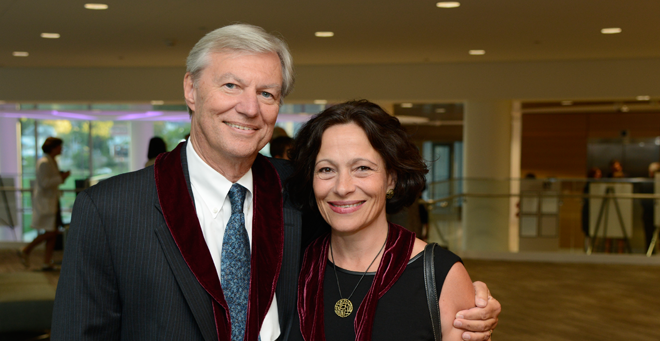 |
|
|
Michael Czech, PhD, and Silvia Corvera, MD |
The discovery of “beige” fat has set scientists on a quest for new approaches to treating type 2 diabetes that harness beige fat’s ability to burn energy and accelerate metabolism. At UMass Medical School, Silvia Corvera, MD, and Michael Czech, PhD, have received a principal investigator partnership grant totaling $2.5 million from the U.S. Department of Defense to investigate whether increasing the quantity and activity of energy-burning beige fat cells by using the gene-editing technology CRISPR will improve the body’s response to sugar and lower blood glucose levels in mice with diabetes.
“It’s an exciting grant because it takes advantage of two developing technologies that have already been shown to be big steps forward, which now we’ll integrate together to hopefully transform this particular approach to therapeutics,” said Dr. Czech, the Isadore and Fannie Foxman Professor of Medical Research and founding chair and professor of molecular medicine.
The project is funded through the Department of Defense’s Partnering Principal Investigator Option, in which two investigators, each designated as a PI, work synergistically on a single project. Dr. Corvera and Czech’s research collaboration builds on important discoveries made separately in the labs of both investigators, who are married.
Having conducted independent research into cell metabolism and its genetic components for decades, the two scientists’ interests converge in wanting to understand, harness and enhance the potential therapeutic benefits of beige fat. Their current collaboration is based on evidence that fat tissue is a key organ that controls glucose metabolism in both mice and humans.
The Corvera lab has developed a method to generate the creation of beige fat cells from precursor cells present in white fat. In 2016, Corvera, the Endowed Chair in Diabetes Research and professor of molecular medicine, published in the journal Nature Medicine a method she developed to generate new human fat cells, particularly beneficial beige fat, from precursor cells present in white fat. When these cells were implanted in mice with diabetes, their metabolism improved.
“This laboratory tool helps us understand how fat cells work,” Corvera said. “Ultimately we hope to determine if we can use these beige cells in humans to treat metabolic disorders like diabetes.”
The Czech lab is dedicated to the discovery of molecular mechanisms whereby insulin signaling controls energy regulation, with the hope of translating findings to the prevention and treatment of type 2 diabetes. The lab has developed a novel CRISPR-based gene deletion vehicle in the form of nanoparticles that enables conversion of white fat cells to beige fat cells.
“Our part of the grant is to make those cells even better at doing what they do by genetic manipulation,” said Czech. “We apply CRISPR technology to the progenitor cells that Silvia is able to increase.”
“We can synergize the work that Mike is doing to use very modern genetic engineering techniques to tackle the big problem of metabolic disease,” said Corvera. “This very seamless collaboration only happens because of the environment where it’s a given that if you have something that supports somebody else’s work, you will go forward together.”
Corvera and Czech credit fellow UMMS faculty who have informed their work with beige fat. They include Michael Brehm, PhD, associate professor of molecular medicine; Katherine Fitzgerald, PhD, the Worcester Foundation for Biomedical Research Chair and professor of medicine; Manuel Garber, PhD, associate professor of molecular medicine; Rene Maehr, PhD, associate professor of molecular medicine; and Erik Sontheimer, PhD, professor or RNA therapeutics.
Related stories on UMassMedNow:
Hudson Hoagland Society celebrates 33rd Annual Meeting
UMMS researchers illuminate origins, benefits of ‘beige fat’
Expert’s Corner: Czech on study of inflammation